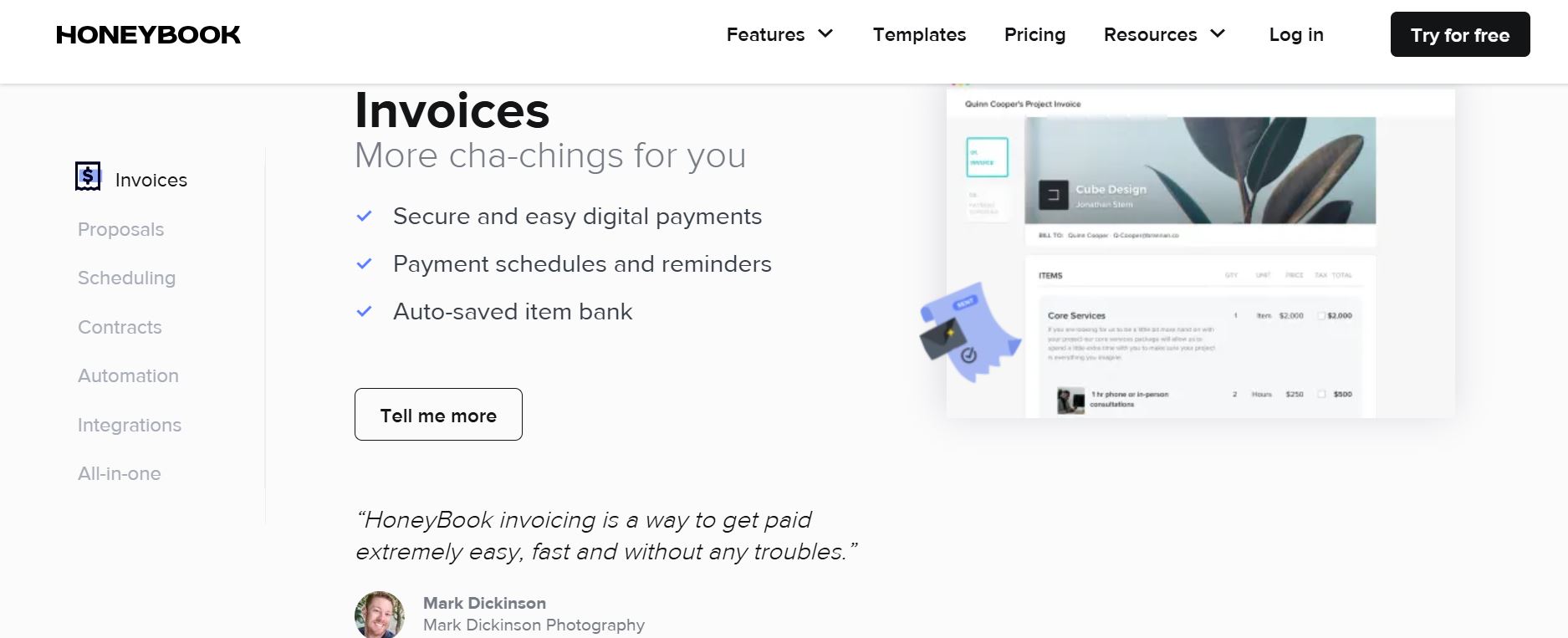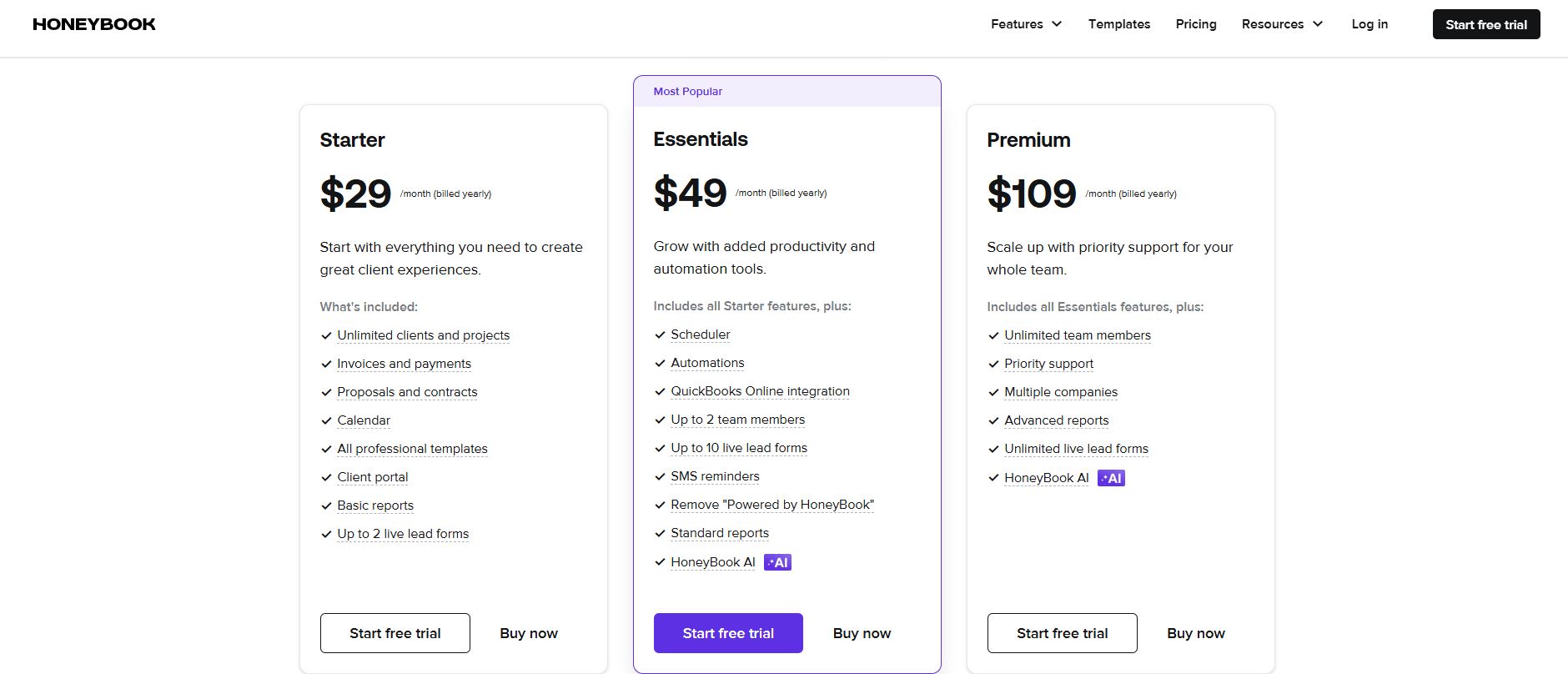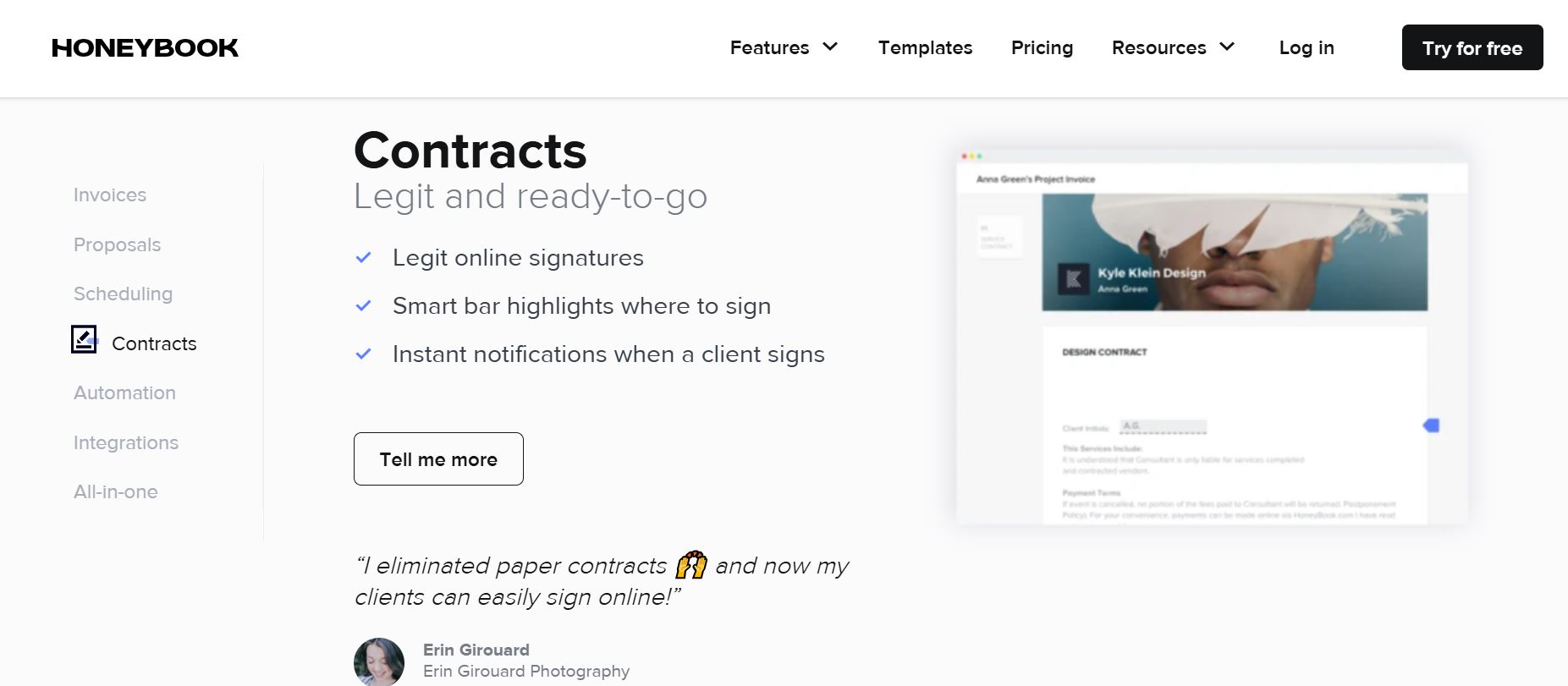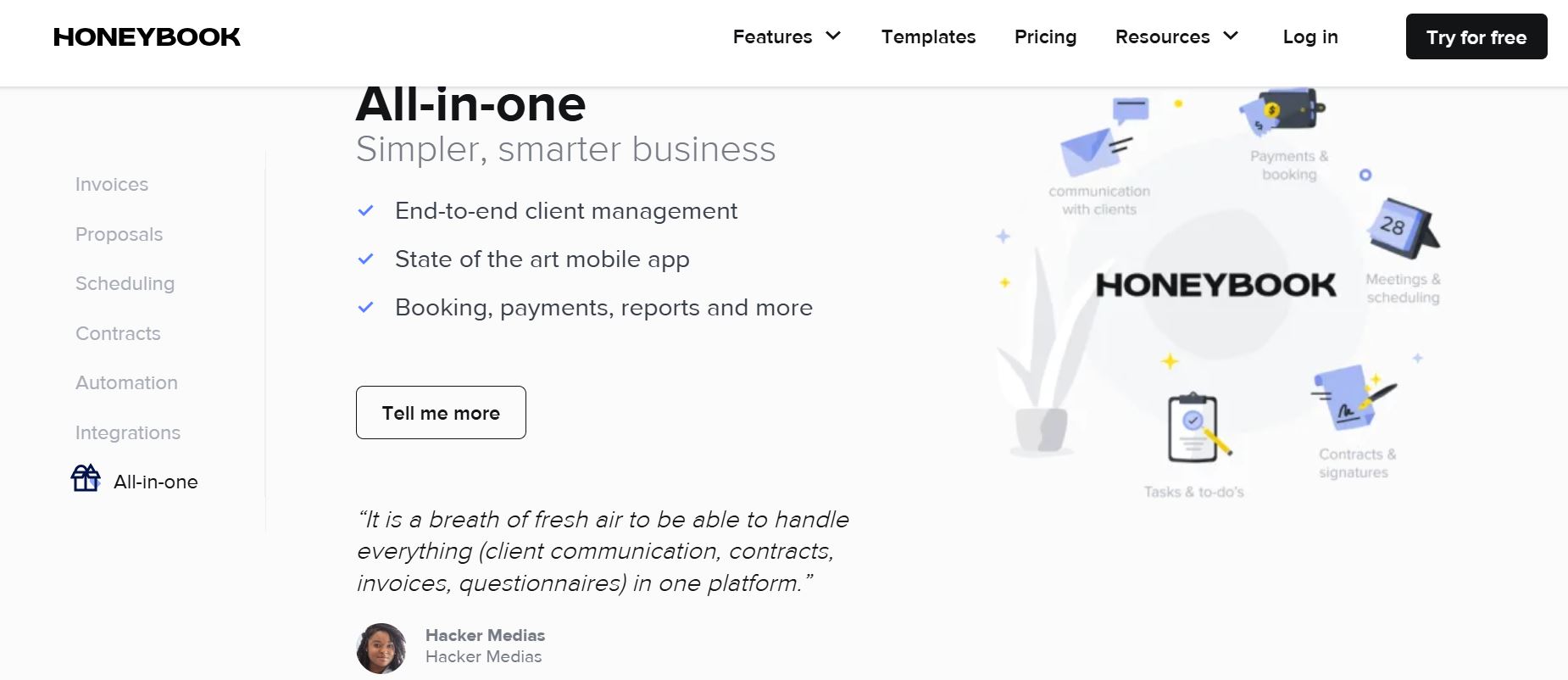HoneyBook is a CRM and business management tool for small businesses in creative industries like photography, event planning, and consulting.
It combines many features to help entrepreneurs stay organised, save time, and manage their workflows more efficiently. Whether you’re booking clients, sending invoices, or managing projects, HoneyBook streamlines these tasks in one user-friendly platform.
In this article, we’ll walk you through HoneyBook’s features, pricing, and potential pros and cons to help you decide if it’s the right tool for your business.

What is HoneyBook Used For?
HoneyBook offers a variety of functions that help small businesses run smoothly. Here’s an overview of what it can do:
- Client Booking: With HoneyBook, you can easily manage your client bookings and appointments, automating the process so you can focus on your work. Whether you’re setting up meetings or scheduling calls, everything’s organised in one place.
- Project Management: Once you’ve booked your clients, HoneyBook helps you manage projects from start to finish. You can create timelines, set tasks, and track progress so nothing falls through the cracks.
- Invoicing and Payments: One of HoneyBook’s standout features is its invoicing system. You can create professional invoices, send them to clients, and even accept payments directly through the platform. No more manually chasing payments.
- Contracts: HoneyBook makes generating and sending contracts for digital signing easy. You can set templates, personalise them for each client, and ensure your agreements are securely stored.
- Workflow Automation: HoneyBook automates many administrative tasks that can slow you down. From automated email follow-ups to project reminders, it helps you stay organised and on top of your business tasks without getting bogged down in details.
These features are designed to help small businesses in the creative industry run more smoothly so you can focus on growing your business and serving your clients. HoneyBook lets you stay professional, organised, and efficient from one centralised platform.
HoneyBook Features
Here are some of HoneyBook’s powerful features for small businesses

1. Client Management and CRM Features
HoneyBook is designed to make client management as smooth and efficient as possible. It helps you manage leads, track client relationships, and streamline communication from one platform. You can store client details, keep track of project status, and easily communicate via email or messages. HoneyBook integrates with your email and calendar, so everything syncs seamlessly. Whether you’re scheduling meetings, sending follow-up emails, or keeping an eye on important dates, HoneyBook ensures nothing gets overlooked. It pulls everything you need together in one place, making client management easier than ever.
2. Invoicing and Payment Processing
One of the major time-savers with HoneyBook is its invoicing and payment processing system. You can create and send invoices directly through the platform, customising them with your branding and payment details. HoneyBook also supports a variety of payment methods, including credit cards and bank transfers, making it easy for your clients to pay however they prefer. And when it comes to processing payments, HoneyBook takes care of the technicalities, ensuring a smooth transaction every time. Once payment is made, the platform updates your records so you can stay on top of your finances without the hassle.
3. Contracts and Documents
HoneyBook’s contract management system is another standout feature. Creating, sending, and signing contracts is easy and secure, all within the platform. You can either use pre-made templates or create custom contracts tailored to your needs. HoneyBook lets you securely store all your documents in one place, ensuring they’re easily accessible whenever needed. It keeps everything organised and legally binding, giving you peace of mind.
Is HoneyBook a CRM?
HoneyBook is a CRM (Customer Relationship Management) tool, though it might not be a traditional CRM like others. It offers a combination of CRM and business management features designed to help small businesses stay organised. it’s a comprehensive solution that covers everything from client relationships to invoicing and contracts, giving you the full package for running your business efficiently.
Who is HoneyBook Best For?
HoneyBook is ideal for service-based small businesses, especially those in the creative industries. If you’re a freelancer, photographer, event planner, designer, or consultant, HoneyBook can help you manage your clients, projects, and payments more efficiently. It’s designed to cater to those who need a simple yet effective solution for organising business tasks without the complexity of traditional management tools.
Whether you’re working with individual clients or handling multiple projects at once, HoneyBook helps streamline your workflow, making it easier to focus on delivering exceptional service. It’s perfect for small business owners who want to stay professional, organised, and on top of their business’s moving parts.

How Much Does HoneyBook Cost?
HoneyBook offers flexible pricing plans to suit different business needs. The pricing structure is based on either a monthly or annual subscription. You also have access to 2 months free plans on all Yearly subscriptions
- The Starter Plan: $36/month and $29/month billed yearly
- Essential Plan: Typically, 59/ month and $49/ month billed yearly
- Premium Plan: If you opt for the yearly plan, you can save money with a reduced price $129/ month and $109/month billed yearly
These plans give you access to all HoneyBook features, including client management, invoicing, contracts, and more. It’s an affordable option for small businesses looking to scale without spending too much on software.
Visit Honeybook’s Pricing Page to learn more
Is HoneyBook Free?
HoneyBook isn’t free, but it does offer a free trial. The trial lasts for 7 days, giving you a chance to explore all the features and decide if it’s the right fit for your business. After the trial ends, you must choose one of the subscription plans mentioned earlier. It’s a great way to test out HoneyBook’s tools and see how they can help you manage your business more efficiently before committing to a paid plan.
HoneyBook Contracts and Document Management
HoneyBook makes contract management simple and secure, helping you handle all your business documents in one place. You can create contracts from scratch or use customisable templates that suit your business needs. Once created, contracts can be sent to clients for digital signing, eliminating the need for paper and snail mail. The platform supports legally binding e-signatures, which makes the entire process fast and secure.
Managing your documents on HoneyBook is equally straightforward. Once a contract is signed, it’s securely stored in the system, so you never have to worry about losing important paperwork. You can also store other documents related to a project, like invoices, proposals, or agreements, making it easy to keep everything organised. This streamlines your workflow, saving time and ensuring all your paperwork is in one easy-to-access location.
With HoneyBook, document workflows are simplified and more efficient, allowing small businesses to focus on what matters most—delivering excellent services to clients.

Pros and Cons of HoneyBook
Pros:
- Easy to Use: HoneyBook is known for its user-friendly interface, which makes it accessible to anyone, even if they’re not tech-savvy. All the features are neatly organised, and the setup process is straightforward.
- All-in-One Solution: It integrates multiple business functions—client management, invoicing, contracts, and payments—into one platform. This eliminates the need for multiple tools and software, saving time and energy.
- Great for Creative Entrepreneurs: If you’re a freelancer, photographer, event planner, or any other type of creative entrepreneur, HoneyBook is designed with your needs in mind. It helps you maintain professionalism and organisation while running your business.
- Excellent Customer Service: Many users rave about HoneyBook’s customer support. The team is responsive and helpful, which is a big plus if you run into any issues or need assistance.
- Positive User Reviews: HoneyBook generally receives positive feedback from users, especially those who appreciate its features and how it improves business management.
Cons:
- Can Be Expensive for Small Startups: While HoneyBook offers a lot of value, the subscription cost might be steep for small businesses just starting out. For those on a tight budget, the price could be a concern.
- Limited Workflow Customisation: Compared to some of its competitors, HoneyBook offers fewer options for customising workflows. This may be restrictive if you have particular needs or complex workflows.

Is HoneyBook Legit and Safe?
Yes, HoneyBook is both legit and safe to use. It’s a well-established platform with a solid reputation among creative entrepreneurs and small businesses. It has thousands of active users who trust it to manage their business operations.
In terms of safety, HoneyBook prioritises security and ensures that your data is protected. The platform uses encrypted data transmission to safeguard your information, and it also offers secure payment processing to protect both you and your clients during transactions. You can feel confident that your sensitive business and client data are in safe hands when using HoneyBook.
Conclusion
In this review, we’ve covered all the important aspects of HoneyBook, from its core features to pricing, pros, and cons. To recap, HoneyBook offers a comprehensive solution for managing clients, projects, invoices, contracts, and payments all in one platform. It’s particularly beneficial for freelancers and small service-based businesses in creative industries, helping them stay organised and professional with its easy-to-use tools.
Final Verdict
HoneyBook is a solid investment for small businesses, especially in creative industries, who need an integrated solution for managing clients and business operations. If you require extensive workflow customisation or have budget constraints, consider exploring alternatives like Dubsado or StudioNinja.
HoneyBook FAQs
1. Can you get paid from HoneyBook?
Yes, HoneyBook allows you to accept payments directly through the platform. You can send invoices and get paid via credit cards, ACH transfers, or other supported payment methods.
2. What bank does HoneyBook use?
HoneyBook works with various payment processors, but the actual bank used for transactions is not explicitly disclosed. However, the platform supports payments through secure and trusted payment gateways.
3. Is HoneyBook a CRM?
HoneyBook is a CRM (Customer Relationship Management) tool designed for small service-based businesses. It helps manage client relationships, communication, and project workflows.
4. How much is HoneyBook’s processing fee?
HoneyBook charges a 2.9% + 25c fee per credit card transaction, while ACH payments have a lower cost of 1.5% per transaction.
5. Is HoneyBook safe?
Yes, HoneyBook is safe to use. The platform uses encrypted data transmission and secure payment processing to protect both your business and client information.
6. How do I use HoneyBook contracts?
HoneyBook lets you create, send, and sign contracts directly through the platform. You can use templates or create custom contracts; all signatures are legally binding.
7. How do I collect money from HoneyBook?
To collect payments, you create and send invoices through HoneyBook. Clients can then pay directly via the available payment methods, such as credit cards or bank transfers.
8. How many companies can I have in HoneyBook?
You can manage multiple companies within HoneyBook by creating different projects for each one. However, remember that HoneyBook pricing is based on the number of active users and projects.
9. Is HoneyBook and QuickBooks the Same?
No, HoneyBook and QuickBooks are different tools. While QuickBooks is focused on accounting and financial management, HoneyBook is a CRM and business management platform designed to handle client interactions, project management, and invoicing. They can be integrated, but they serve different primary functions.
Related Article: Ubico Reviews: Is it the Best Tool for Your Sales Team?